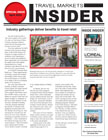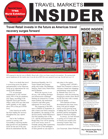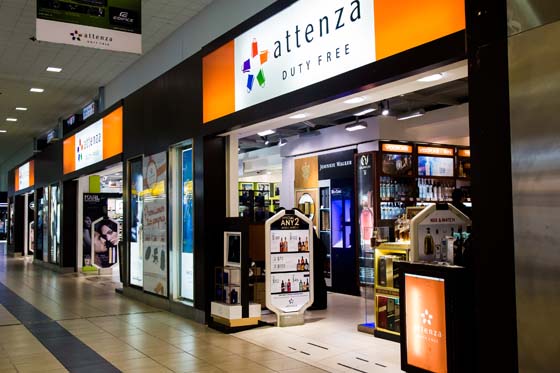
One of Motta Internacional’s Attenza stores in Panama’s Tocumen International Airport.
Motta also runs a number of distribution companies in Central and South America, delivering product to its own and non-owned stores. Its Carisam division in Miami distributes to cruise ships. It operates a number of branded boutiques in the domestic markets as well, for brands such as Cartier, Ferragamo, Tiempo (watches), Tory Burch, and Coach, and has a significant electronics business.
Under the Attenza Duty Free brand, Motta operates duty free stores and branded boutiques in Cali and El Dorado airports in Colombia, at San Salvador airport in El Salvador, at Managua Augusto C. Sandino International Airport in Nicaragua, Caracas Simon Bolivar International Airport in Venezuela, Tocumen in Panama, Quito Airport in Ecuador and cruise port stores Puerto Progreso in Mexico’s Yucatan.
There are several new stores underway as well, says Motta Internacional CEO Erasmo Orillac.
Motta has just opened a new 67 sqm liquor store in the Tocumen Airport North Terminal, and won a bid for a new 124 sqm traditional duty free store in Tocumen, which is now under construction.
“We also won a bid in April in a joint venture with Adidas to open a 65 sqm sporting goods store that will carry sportswear and athletic shoes. These are our three main ventures in Panama Airport right now,” says Orillac.
Other recent projects include the opening of the Attenza Duty Free stores in Quito airport in February 2013. Now that the stores have been open for a while, the company is fine-tuning its business there, says Orillac.
“In Quito we opened a traditional departures and arrivals store covering close to 1,000 sq meters. We are the exclusive operator in Quito, under a 12-year contract. We are now analyzing results and making adjustments to the assortment and layout as needed. The Arrivals store has already gone through a substantial remodeling; we added a M.A.C store, which opened in February, and we renovated the liquor department, tweaking the spaces. The goal, of course, is to get the most revenues from every meter.”
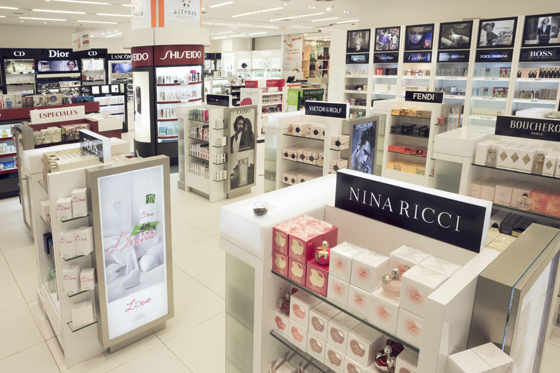
Attenza offers an extensive selection of top name liquors in the departure store at
Ecuador’s New Quito International Airport.
Perfumes and cosmetics are the number one category in the Attenza stores; followed closely by liquor. Number three is confectionery, which Orillac says is growing substantially.
“Every year we are surprised by the increase in the confectionery sales – it surpasses our expectations every year. Confectionery is very giftable, it has universal appeal and an attractive price point.”
The category has become so important that Motta is reconfiguring the Quito store to feature more personalized spaces for confectionery.
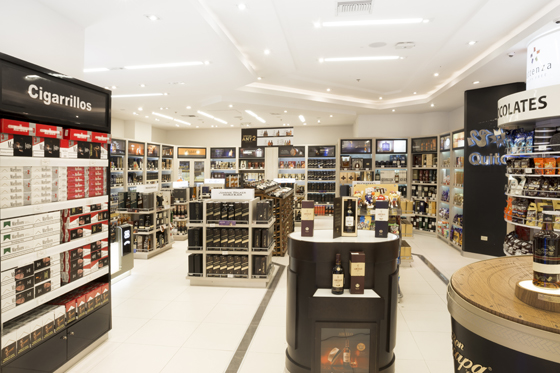
Attenza offers an extensive selection of top name liquors in the departure store at
Ecuador’s New Quito International Airport.
Motta takes great effort to make sure it is serving all its customers, he explains.
“To the public, Motta, with the name Attenza, means extraordinary attention. In our stores we want you to feel welcome, to find what you want at a fair price, and we want our customers to be happy and to come back. To the suppliers, Motta means we will carry out your marketing policies, implement your policies and provide good execution. We do the job right. To my employees, we want to be a very fair and good employer. My stores are a place where you aspire to work: we provide a challenging job, growth opportunities, we are good for the community, we provide a place to better yourself.
“When we put all these together, the goal is that we want to have what our customers want to buy – per nationality,” he says.
According to the company records, Brazilian tourists make up a significant percentage of Motta’s duty free airport sales, and Orillac says serving these customers is a priority.
“About 18% of the sales in the Motta stores in Panama come from Brazilians, 11% from Colombians, 9% from Ecuadorians, 7% from travelers from the USA, 7% from Venezuelans, 5% from Panamanians, 5% from Chileans, and so forth.
“So with Brazilians accounting for such an important part of the sales mix, my challenge is to find which products the Brazilians are looking for. I have a list of 10 items that the Brazilian are buying – they buy this whisky, they buy this perfume, they buy this candy. If I am out of that product in any of my terminals, we lose the sale and the potential for additional sales. So watching that these products are always well-stocked and available is a priority for everyone in the stores.
“As a result, we are growing our sales faster than the traffic is growing, because we are being very efficient, we have gone back to basics,” he says.
Alberto “Pancho” Motta, Jr., Director of Motta Internacional, and son of founder Alberto Motta Sr., sees the company’s success over the past six –plus decades as the result of the way the company approaches the business:
“My first concern is always our employees. If they do well, our business will run well. Then obviously, comes our clients,” says Motta.
“I hope that when people think of Motta Internacional they see it as a well-run company, that it is run honestly, and that it is run so that all three parties can make money: the supplier, us and our clients. If one of the three doesn’t make money, the chain stops.”
Motta, speaking both as head of his company and as the president of industry trade group the International Association of Airport Duty Free Stores (IAADFS) sees the biggest challenge facing the duty free industry in the Americas – particularly in the U.S. — as the structure of airport concession bidding, with airport authorities demanding a flat percentage of sales, no matter the product category.
“I worry that airports don’t understand the marketplace they have. They want a percentage of sales. This is fine, we can work with that. But you can’t have the same percentage on everything. Liquor and perfume and cigarettes can afford to pay the higher percentage, but if I want to sell you a camera, I can’t pay 20-30% to the airport. Customers will find lower prices downtown. You can’t have the same percentage on jewelry that you have on batteries.
“We would like to see the airports change their bidding system so that we can offer more products for sale in the airport. Even if a bid calls for one concessionaire, that concessionaire can still bring in more products. But the authorities have to be fairer with the prices that they require from their concessionaires members, and not just look at the flat percentage.”
Lois Pasternak




